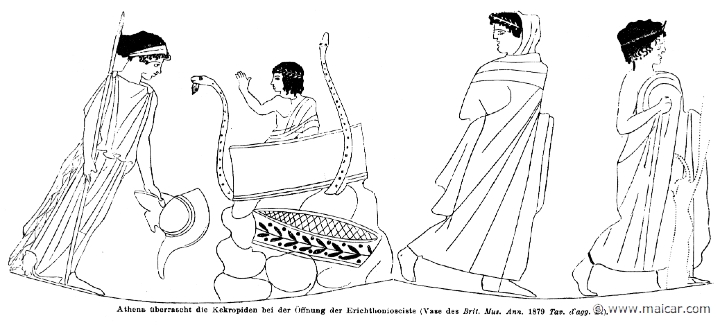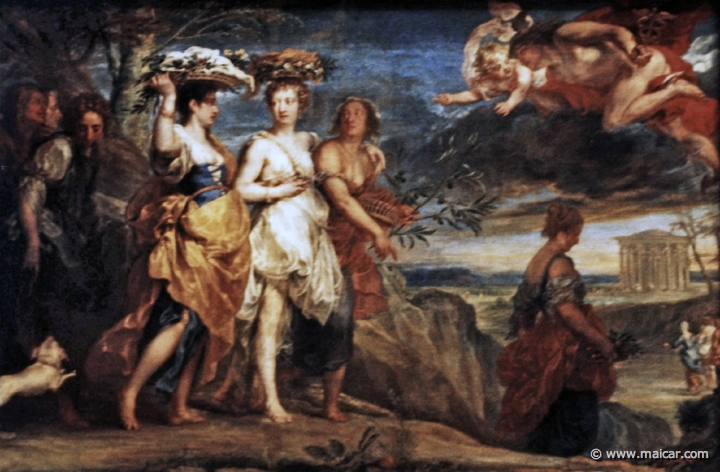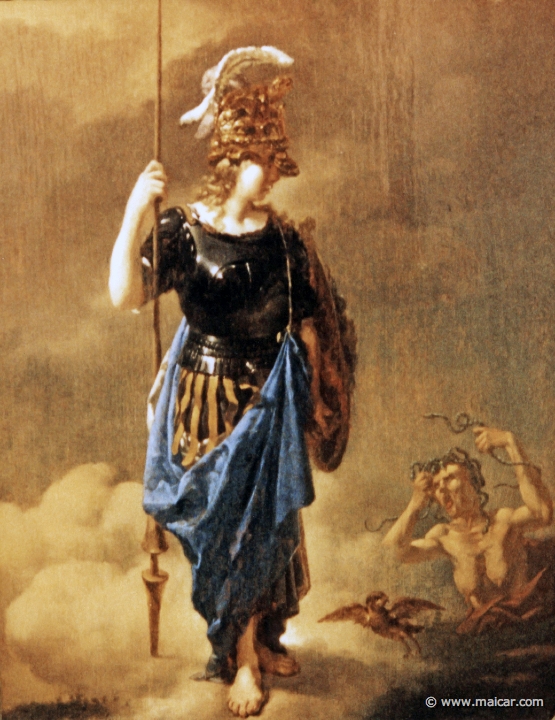King Cecrops 1 and his time
|

|
Athena catches the daughters of Cecrops 1 opening the chest of Erichthonius 2. RI.1-1307: Athena überrascht die Kekropiden bei der Öffnung der Erichthoniosciste (Vase des Brit. Mus. Ann. 1879). Roscher, 1884.
|
|
Actaeus 1, who is said to have been the first king of the region that came to be known as Attica, had a daughter Aglaurus 1. Through marrying Aglaurus 1, Cecrops 1 inherited the throne and became the first king of Athens little before the
times when The Flood of
Deucalion 1 destroyed mankind. King Cecrops 1, who sprang from the soil (see AUTOCHTHONOUS)., and sometimes is called son of Gaia, had a body compound
of man and serpent. The land which was formerly
called Acte he named Cecropia after himself. During
his time, the gods competed with each other to gain
the patronage of the cities, and in
Athens this competition
took place between
Poseidon and
Athena (see these). Because Cecrops 1 witnessed that Athena had been the first
to plant the olive, the twelve gods who had been
appointed as arbiters by
Zeus, decided in her
favor.
Some say that Cecrops 1 was a pious king because he was the first to acknowledge Zeus as the supreme god,
and refused to sacrifice anything living, but
instead burnt cakes on the altar. He was a
contemporary of the utterly impious
Lycaon 2, who sacrificed
a human baby on the altar of
Zeus, and was punished for
this outrage by being turned into a wolf.
The Offspring of Cecrops 1
Cecrops 1 had by Aglaurus 1 one son Erysichthon 1, and three daughters: Aglaurus 2, Herse 2 and Pandrosus. Erysichthon 1 never inherited the kingdom as his father survived him. In addition, he was childless, so Cranaus, another "son of the soil" (see AUTOCHTHONOUS)., but in reality the most powerful of the Athenians, came to the throne, and it was during his reign that The Flood in the age
of Deucalion 1 took
place. Cranaus was later expelled by Amphictyon, a
son of Deucalion 1,
who reigned in his stead.
Important Event during the reign of Cecrops 1
When Cecrops 1 was still king of Athens,
Hephaestus tried to
embrace Athena. The goddess refused to consort with him, but he dropped his seed on her leg. In disgust, she wiped off the seed, and threw it on the ground; and as she fled and the seed fell on the ground, the child Erichthonius 2 was produced. This is why some call him son of Hephaestus
and Gaia.
Athena is said to have brought up Erichthonius 2 without the other gods knowing about it. When he was still a baby, she put him in a chest and committed it to Pandrosus, one of the daughters of Cecrops 1, not telling her what there was within, and forbidding her to open it. Some say that Pandrosus' sisters, out of curiosity, opened the chest, being destroyed by a serpent which was coiled about the child, but others affirm that the girls were driven mad by the goddess' anger, and threw themselves down from the Acropolis. Still others assert that all three girls opened the chest, and Athena learned what they had done through a crow, which gave the secret away while the girls, driven mad by the goddess, threw themselves into the sea.
|

|
0538: Mercury discovers Herse (Hermes and the daughters of Cecrops: Herse, Aglaurus and Pandrosus). Painting by Jan Boeckhorst 1604-1668. Künsthistorische Museum, Wien.
|
|
Fate of Erichthonius 2
When Erichthonius 2 grew up, he expelled Amphictyon and became king of Athens. And at his death,
he was buried in the same precinct of
Athena, where he had been
brought up by the goddess.
What Publius Ovidius Naso says
However, Publius Ovidius Naso says that the only
one to betray Athena's secret was Aglaurus 2, while Herse 2 and Pandrosus remained faithful. No one was killed on the occasion, but Athena never forgot Aglaurus 2's betrayal.
Meeting during a Festival
After some time, when there was a festival of
Athena in the city, and
young girls bore to the temple gifts in
flower-wreathed baskets on their heads,
Hermes, who was flying above the region and looking down, discovered among the young girls the three daughters of Cecrops 1, and he found Herse 2 more lovely than all others round her. Astounded at her beauty, the god followed the girls to their house. When he came in, Aglaurus 2 first saw him, and he openly told her who he was and that he was there for Herse 2's sake. He asked of her to be true to her sister, to consent to be called the aunt of his offspring, and to favor, as he put it, a lover's suit. However, treacherous and greedy Aglaurus 2 demanded a considerable amount of gold as the price of her service, asking him, in the meantime, to leave the palace. But Athena, who had not forgotten Aglaurus 2's betrayal and kept an eye on her, could not accept that the same girl who, contrary to her command, had uncovered her secret, would now be in favor with Hermes and with her
sister, and besides rich in gold.
Athena's plan
So Athena decided to
visit Envy in her cave. Her home, filthy with black
gore, is hidden in a valley where no sun shines,
and no breeze blows.
When Athena came
through the thick black fog that wrapped the place,
she beat upon the door with end of spear, and when
the doors opened she stood without, not wishing to
enter such a disgraceful abode. Envy sat within,
eating her usual food: snakes' flesh; but when she
saw the goddess, she came out with her teeth foul
with mould, her venom dripping down from her
tongue, and looking at her with her awry eyes.
Envy's mood
As they say, Envy never smiles, except at the
sight of someone else's troubles. She never sleeps
either, because she is too disturbed with wakeful
cares. She hates the success of others because at
its sight she pines away. She is herself her own
punishment because as much as she gnaws she is
herself gnawed.
The goddess' instructions
|

|
Athena visiting Envy. 0425: Athena visits Envy. Painting by Karel Dujardin 1626-1678. Gemäldegalerie der Akademie der bildende Künste, Wien.
|
|
Athena came down to business very quickly, and asked Envy to infect with her venom the heart of Aglaurus 2. And having set the task in a very short speech, Athena returned to
Olympus.
Not being even able to think about the goddess' splendor and triumph, Envy took her staff, thick-set with thorns, and left for Athens. In her way, she
tramples down the flowers and causes the grass to
wither, polluting with her foul breath countries,
cities and homes. She feels she wants to weep at
the sight of Athens
because in the midst of its art and its joy she
does not see any reason for others' tears.
Envy's Operative System
Having arrived to Aglaurus 2's bedroom, Envy touched her breast with her festering hand, and took care to fill her heart with pricking thorns. Then she breathed her poisonous breath into the girl's nostrils, and spread her venom through her heart and bones. Envy's final touch consisted in fixing a cause for Aglaurus 2's grief. So Envy pictured to her imagination the marriage of Hermes and Herse 2, her sister, taking care to magnify the excellence and beauty of everything.
How the poison worked
When the venom of Envy took possession of Aglaurus 2, she started eating her own heart. Careworn by day and by night, she could not stop envying her sister's happiness, pictured in her own head. She even thought about dying so that she might not behold such happiness implemented in life.
Aglaurus 2 leaves life
Finally, she sat down at the threshold, trying
to prevent Hermes to come in and meet Herse 2, and declaring that she would not move from the spot until she had foiled the god's purpose. Hermes found that bargain worth to stand by. And while he opened the door with a touch of his wand, Aglaurus 2 discovered she could not move any more. Her limbs stiffened stopping his functions and choking off her breath. She turned into a lifeless statue, and Publius Ovidius Naso affirms that the stone was not white in colour because her soul had stained it black.
Epilogue
Hermes consorted with lovely Herse 2, and she gave birth to Cephalus 2. Eos (Dawn) fell in love with Cephalus 2, and carried him off to Syria where she gave birth to Tithonus 2. Tithonus 2 is the father of Phaethon 1. Phaethon 1 was ravished by Aphrodite, and made a keeper of her shrine; they had a son Astynous 1. The son of Astynous 1 is Sandocus, who migrated from Syria to Cilicia and founded a city, Celenderis. Sandocus had a son Cinyras 1 by Pharnace,
daughter of King Megassares of Hyria.
Cinyras 1, who came to
Cyprus and founded Paphos and later swore to send
fifty ships to the Trojan
War but sent only one is, according to some,
Adonis' father.
|